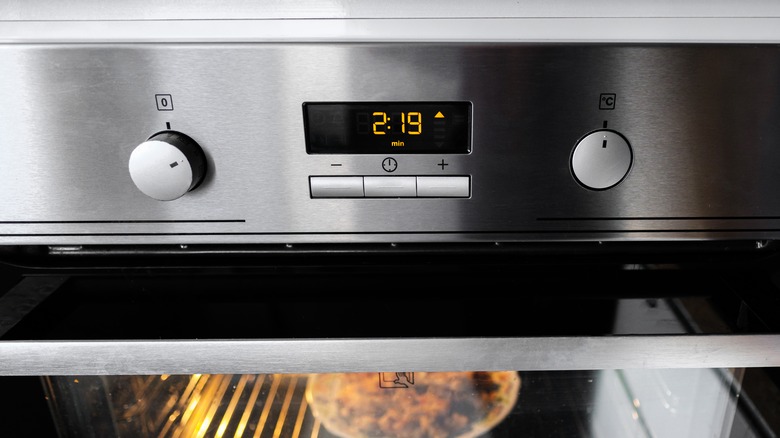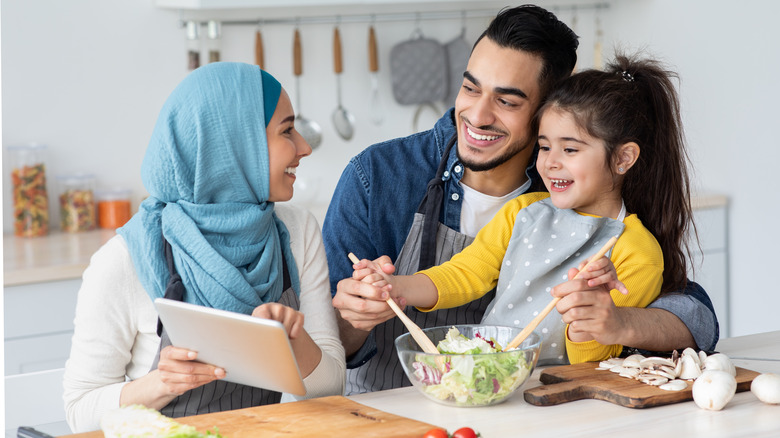The Real Reason Timing Can Make Or Break A Recipe
One of the main objectives of food media should be to demystify cooking and food preparation as best as possible to help encourage more people to be active in their kitchens. Whether due to a fear of injury or fire, laziness, lack of time, or an abject lack of interest, many will opt for DoorDash, takeout, pickup, frozen, or fast food over a home-cooked meal, especially after a busy workday. For those looking after fussy, finicky little tykes (or spouses), immersing in a multi-step recipe is not exactly a tenable luxury.
For all intents and purposes, though, home cooking can be a wildly satisfying, deeply personal, and incredibly worthwhile act that brings sustenance, both physically and emotionally. Comfort food is a concept for precisely this reason, but many don't acknowledge that comfort cooking can be just as powerful. Therefore, instilling and abiding by safe cooking and the best tips for surefire recipe (or freestyling) success is paramount.
Time is perhaps the single most crucial aspect of the cooking experience, per RecipeLand. It's paramount to ensure that all of the meal's components are cooked in the right order, are ready at the right time, that everything that should be cold is very cold, and that everything that should be hot is piping hot. Unsure of how to achieve this? Read ahead for some tips and tricks.
Tips for not cooking against the clock
As Reluctant Gourmet notes, it's important to always give yourself enough time to cook. When you start to rush or get flustered, mistakes inevitably happen. Celebrate your strengths and mitigate your weaknesses; take help from the store with pre-packaged or pre-cut produce, cook savory more instead of baking a lot, prioritize one-pot meals over dishes that require the oven, stove, and an air fryer, and have family or friends help with the whole process.
RecipeLand also notes the importance of doing as much prep work as possible beforehand so that when the actual cookery is being done, you're not distracted by minor tasks like chopping herbs. Try to time the recipe backward, noting that if you want everything served hot and fresh, it's important to start one component about 20 minutes before another and so on.
Table & Spoon acknowledges the ease of opting for raw or uncooked dishes or starters or salads with minimal work, i.e., Caprese salads, bruschetta and crostini, green salads, charcuterie, olives, cheese boards, cured meats, caponata, etc. If it helps, write out lists or schedules, too. If you're having guests, ask them to bring desserts or drinks. Take help where you can get it! This way, you can focus on the piece de resistance and a few sides, ensuring an enjoyable, pleasurable experience for all.
What to keep in mind when cooking
Serious Eats acknowledges variables that can affect recipe success, cooking experiences, and timing overall. Listing the importance of thermostats, oven disparities, equipment, stoves, oven and stove differentiations, types, and recipe specifics, the publication delves into the musts that should be met to ensure a positive cooking experience. For instance, it's imperative to be aware of temperature discrepancies. Relatedly, oven specifics differ from home to home, so you need to get to know yours to know if it's running a little cool, a little hot, or just being wonky overall. It can sometimes also make sense to have a separate thermometer within the oven itself to ensure accuracy.
Serious Eats also notes that it's also very important to be mindful of the sizes of your cooking vessels, as well as any intricacies that might come along with these (instant pots, slow cookers, air fryers, etc.) And while it's best to follow a recipe, some cooks tend to follow the instructions to a T when it may be smart to make certain teaks, adjustments, or changes depending on the specifics of your kitchen.
Lastly, and this should go without saying, always read your recipes through in their entirety before making them! You never know if there is some wild ingredient you hadn't budgeted for, a timely step you weren't prepared for, storage or rising component you hadn't thought of, etc. Reading the entire recipe before beginning your journey is half the fun.
Final notes on positive, encouraging cooking
Let's be honest, though; if all of this picture-perfect planning doesn't happen, though? Then no biggy! It's your kitchen, not a fine dining restaurant — don't let that unnecessary pressure otherwise malign your lovely cooking experience. You should be enjoying your time in the kitchen, not dreading it.
At the end of the day, cooking should be a deeply pleasurable activity that is then followed by something just as enjoyable: Consuming whatever delicious food you just created. So don't feel like you need to micromanage yourself, desperately follow a recipe, or make minute changes to appeal to your family's tastes. Instead, develop a groove and understanding of your kitchen and your cooking process, as Serious Eats recommends, your likes and dislikes, your tastes and peculiarities, and soon you'll enter a flow, not being hamstrung by any silly insecurities or mishaps.
Follow these steps (and your intuition) and go forth and cook — we promise it's worth it!



